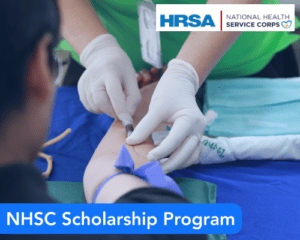Student-centric advice and objective recommendations
Higher education has never been more confusing or expensive. Our goal is to help you navigate the very big decisions related to higher ed with objective information and expert advice. Each piece of content on the site is original, based on extensive research, and reviewed by multiple editors, including a subject matter expert. This ensures that all of our content is up-to-date, useful, accurate, and thorough.
Our reviews and recommendations are based on extensive research, testing, and feedback. We may receive commission from links on our website, but that doesn’t affect our editors’ opinions. Our marketing partners don’t review, approve or endorse our editorial content. It’s accurate to the best of our knowledge when posted. You can find a complete list of our partners here.
What is an Accelerated Nursing Program?
 By
Cait Williams
By
Cait Williams 
Cait Williams is a Content Writer at Scholarships360. Cait recently graduated from Ohio University with a degree in Journalism and Strategic Communications. During her time at OU, was active in the outdoor recreation community.
Full BioLearn about our editorial policies

Maria Geiger is Director of Content at Scholarships360. She is a former online educational technology instructor and adjunct writing instructor. In addition to education reform, Maria’s interests include viewpoint diversity, blended/flipped learning, digital communication, and integrating media/web tools into the curriculum to better facilitate student engagement. Maria earned both a B.A. and an M.A. in English Literature from Monmouth University, an M. Ed. in Education from Monmouth University, and a Virtual Online Teaching Certificate (VOLT) from the University of Pennsylvania.
Full BioLearn about our editorial policies

An accelerated nursing program is just what it sounds like! It is a nursing degree that you complete within a shorter time frame. Instead of spending four years in school, students may spend anywhere from 15 to 24 months to complete their bachelors of science in nursing. In this article, we will talk about all things accelerated nursing and give you all the information you need to pursue one!
What is an RN to BSN program?
In your search for accelerated nursing programs, you may come across a lot of programs that state that you can finish your BSN in as little as one year. However, these programs are meant for individuals who may already be registered nurses (RNs). Take a look at the difference below between RN to BSN programs and accelerated BSN programs.
| Accelerated BSN | RN to BSN program |
| Typically for individuals looking to change careers Require no previous experience Usually require applicants to already hold a bachelor’s degree | Typically for individuals who are already RN’s, but do not hold a BSN Programs may require certain clinical experience Don’t usually require individuals to already have a bachelor’s degree |
For the purposes of this article, we are not talking about RN to BSN programs, but rather, about accelerated BSN programs. While some of the policies, requirements, and time frames may be similar, these programs are not interchangeable.
Apply to these scholarships due soon
See all nursing scholarshipsWhat are the requirements for accelerated nursing programs?
Because of the rigor of most accelerated nursing programs, they will typically require you to already have a bachelor’s degree in something as well as have completed certain prerequisite courses. You may also need to have:
- A certain GPA
- Specific grades
- Letters of recommendation
- Other application materials
However, those requirements may vary between schools, so make sure you check with each program that you are seriously interested in.
How much do accelerated nursing programs cost?
The cost of programs can range quite a bit depending on the location, duration of the program, scholarships, and financial aid you may receive. For example, George Washington University of Pennsylvania is a 15 month program that costs around eighty thousand dollars, while Baldwin Wallace University’s 15 month program costs forty thousand dollars. Don’t let the dollar sign scare you though. There are plenty of funding opportunities out there! Don’t forget too, that while tuition may be expensive, the nursing field can offer a vast range of well paying salaries immediately upon graduation.
How long are accelerated nursing programs?
The length of accelerated nursing programs can vary. They usually range anywhere from 15 to 24 months if you are completing a full BSN from start to finish. During this time, you’ll likely have little time off and will follow a schedule that includes lab work, class work, and clinical rotations.
Are accelerated nursing programs hard?
Accelerated nursing programs are no joke. They pack all the knowledge of a bachelor’s degree into a program that’s two years or less. Students must typically maintain a certain GPA as well as certain grades. Some programs may even have rules about how many Bs or Cs you’re allowed to get throughout the entirety of the program. You may also be required to attend every class, lab, and clinical without many exceptions aside from being sick.
Part of the difficulty of this program also comes through the schedule you’ll follow. Instead of semesters, you may use a 7-8 week class system and will study all year round with short breaks in between instead of long summer or winter breaks.
What is the difference between normal and accelerated nursing programs?
The real difference between these programs is the time it takes to complete them and the requirements for each. Accelerated BSN programs typically require you to already have a bachelors in something and have completed all the proper prerequisite course work. However, for students who complete traditional four year nursing degrees, you should be able to enter with no prerequisite course work and you certainly do not need to have another bachelors completed.
What is the fastest way to become an RN?
Becoming a registered nurse is not an easy process. Nurses are highly trained medical professionals that serve as an integral part of the healthcare system. If you want to become a registered nurse, there are ways that you can finish an associate degree and then take the proper exams to become an RN. However, it’s important that you understand the weight of having a bachelors in this field over having an associates.
While those with associate degrees are able to be hired, having a BSN may make you much more marketable and desirable to certain employers. In fact, some states and healthcare facilities are moving towards putting laws in place such as ‘BSN in 10’, which would require all RNs to complete their BSN within ten years of becoming licensed. This law is currently in effect in New York.
What classes do nurses take?
Nurses take a wide variety of classes that focus on everything from anatomy and physiology to patient care and relations. Nurses often perform much of the bedside care in hospitals. Therefore, it is critical that they know not only how to perform procedures, but that they also can perform high quality patient care. Such care includes making patients feel at ease, heard, and cared for in the hospital. Some general classes nurses take are listed below. Most programs will have a list of classes on their website that you can view when exploring their program.
- Pharmacology
- Ethics in nursing
- Psychology and mental health
- Chemistry
- Microbiology
How do you know if an accelerated nursing program is right for you?
Let’s ask a couple questions to answer this question:
First, what is your goal with attending an accelerated nursing program?
It’s important to know why you’re doing something before you do it. These programs are a lot of work and will be difficult. Have a reason for doing this program, whether it’s because this is the field you’re passionate about, you are looking to switch careers, or you’re looking for a better job to support yourself and your family.
Second, what does your financial situation look like?
An accelerated BSN program is pretty much a full time job. You may be able to squeeze in a part time job on weekends and late nights, but don’t forget that you also have homework to do and that you’ll need some time to recharge as well. Many programs recommend that students do not work during this time. Assess your finances on your own and with the help of someone you trust. Don’t forget that you’ll also have to pay tuition during these programs too.
Other questions to consider
Below are just a few more questions that might help you further assess whether an accelerated program is right for you!
- Do you enjoy studying science?
- Do you enjoy caring for patients and working with people?
- Will you need to move for the program?
- What previous education or experience do you have?
Accelerated Nursing Programs
Before we close out, we just want to leave you with a few examples of some accelerated BSN programs that are available. Below are three programs from across the United States.
Metropolitan State University of Denver
- Cost: $40,000
- Duration: 17 months
- Location: Denver, Colorado
Baldwin Wallace University
- Cost: $40,000
- Duration: 15 months
- Location: Berea, Ohio
Duke University
- Cost: $100,00
- Duration: 16 months
- Location: Durham, North Carolina
Frequently asked questions about accelerated nursing programs
What is the lowest GPA accepted for nursing school?
How many classes can you fail in nursing school?
What is the quickest nursing program?













 SAT" printed on his pencil">
SAT" printed on his pencil">
